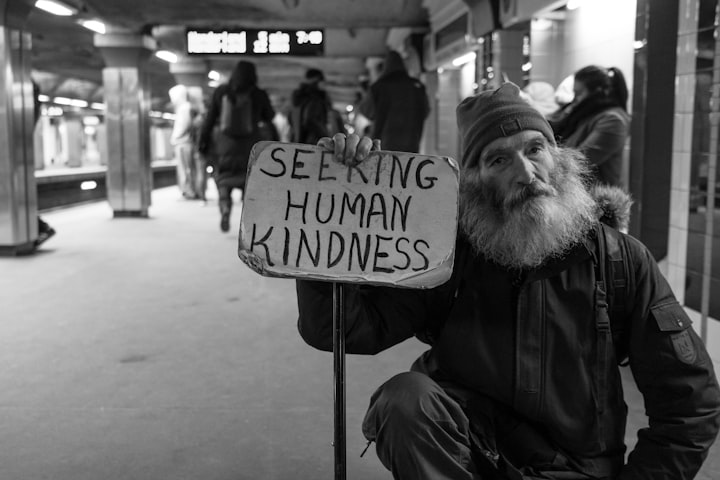Why People Are Terrible At Being Empathetic
How can a basic human trait doesn't exist for most people

We hear about it, we think about it, but do we actually practice it? Yes, I am talking about empathy. Empathy is the ability to understand and share the feelings of others. It is a crucial part of being human as it allows us to connect with and care for one another. While you might be thinking, ‘How hard is it to be empathetic?’ you would be surprised by hard it can be for some people.
In fact, many people struggle to be empathic and often times mistake it for sympathy. So in this article, lets discuss some of the most prominent reasons why people struggle with empathy and ask ourselves ‘Are we naturally unable to be empathetic or do people not deserve our empathy?’
Reason #1- Empathy Is Too Much Work
One of the main reasons why people are terrible at practicing empathy is that it can be mentally and emotionally draining. It requires us to step outside of ourselves and our own experiences and connect with the feelings and experiences of others. This can be challenging, especially if we are busy dealing with our own stress, anxiety, and emotional struggles.

Being empathetic requires work and in order to truly connect with someone else’s emotions, we need to be willing to open ourselves up and share our own emotions as well. This can be uncomfortable for many people, especially if they have been taught to suppress their emotions or view vulnerability as a weakness. In cases like those, people will try to find a quicker solution in order to remedy a person’s emotional suffering. This usually comes in the form of alcohol or half-assed pep talks.
Reason #2- Sympathy = Empathy
Sympathy and empathy are two commonly used terms that describe our ability to understand and share the feelings of others. While these terms are often used interchangeably, they have distinct meanings that are often mashed together and commonly misinterpreted for one and another.
Sympathy is defined as feeling pity or sorrow for someone else’s misfortune. It is a more superficial emotion that involves recognizing and acknowledging someone else’s pain, but not necessarily experiencing it for oneself. When we express sympathy, we are often expressing our concern or condolences for someone else’s situation, but we may not be able to fully understand or relate to their experience.
Empathy, on the other hand, involves putting oneself in someone else’s shoes and feeling what they are feeling. It requires a deeper level of understanding and connection with the other person. When we empathize with someone, we are able to not only recognize and acknowledge their pain, but we also try to understand the severity of their pain to better connect and console them. This allows us to truly understand and connect with the other person’s emotions and experiences.
To better understand the difference between two, here is an example: One day, a friend’s dog dies and they are absolutely heartbroken and unable to move on with their lives.
A sympathetic friend would approach this by saying something like:
“I’m sorry for your loss. I’m sure they are in a better place now.”
This shows that we recognize their pain and are acknowledging their situation, however it also implies that we want them to get past being emotional as soon as possible. However, if we empathize with our friend, we might say something like:
“I can’t imagine how difficult this must be for you. Your dog must have meant a lot to you?”
This statement shows that we not only recognize their pain, but we are also further inquiring about the deeper sentimental attachments of their pain to fully understand and place ourselves in their emotional state. By doing so, it helps the distressed friend process and talk through their emotions and eventually finding closure at their own pace.
Reason #3- Bias & Cultural Influences
Furthermore, practicing empathy often requires us to confront our own biases and prejudices. We all have implicit biases that shape how we view the world, and these biases can make it challenging to connect with others who are different from us.
We often see how personal bias instantly affects people’s ability to empathize especially in discussions where politics is involved. There have been thousands of instances where arguments can arise by simply stating the notion of your political affiliation. Whether you are Democrat, Republican, or Independent, once the conversation devolves into a yelling match, any chance of empathy instantly goes out the window.
In addition, cultural and societal factors can also play a role in our ability to practice empathy, as in some cultures, there is a stigma against showing vulnerability or expressing emotions, which can make it challenging for people to practice empathy. In more complex examples of this are some Eastern cultures such as Japan and China, where there is a cultural emphasis on self-control and emotional restraint.

This can make it more challenging for individuals in these cultures to express empathy, as showing emotions is often viewed as a sign of weakness. Additionally, there is often a cultural expectation to prioritize the needs of the group over the needs of the individual, which can make it more challenging for individuals to focus on and empathize with personal emotions and experiences.
Reason #4- Some People Just Don’t Know How
One the simplest and arguably the most reasonable explanation on why so many people struggle with practicing empathy is because they lack the skills and tools to do so effectively. I mean, if people do not know how to talk and connect with each other then they will never learn how to.

For example, active listening, perspective-taking, and emotional regulation are all important skills that can help us practice empathy. However, I highly doubt these skills are actually part of the traditional education curriculum such as English, Political Science, or even Philosophy. Even if it was, putting these skills to everyday practice is more difficult than one would think, as practicing empathy is arguably just as challenging as learning a new language.
Why Empathy Is So Important?

Practicing empathy is crucial for building and maintaining healthy relationships, both personal and professional. It can also help us to better understand and respond to the needs of others, which is essential for effective communication and problem-solving. While practicing empathy can be challenging, it can help us to become more self-aware and develop a greater sense of compassion towards ourselves and others.
About the Creator
Jay Kobayashi
A starving writer from LA who aspires to be plagiarized one day. I like to write about academic pieces that identifies philosophy and psychology in pop culture, and sometimes random fun pieces that interests me or the algorithm!






Comments (1)
valuable information.